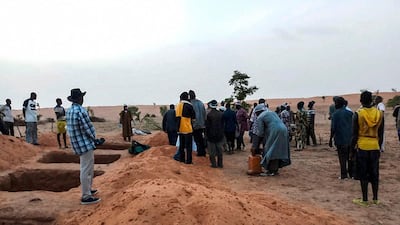Thirty-five people were killed in a massacre at a village in central Mali, the authorities said on Wednesday, in a toll much lower than the earlier estimate of 95.
Twenty-four of the dead were children, the government said. It said that six people had been detained "after routine checks".
In another incident on Wednesday, an attack on villages of the Dogon ethnic group in the south of country killed at least two people, with several others wounded.
Gunmen late Sunday surrounded the village of Sobane Da, in a Dogon enclave, killing inhabitants and torching homes in a seven-hour assault, survivors said.
The killings stirred fears of tit-for-tat violence among different ethnic groups in the region, where tension has soared since the 2015 emergence of a violent Islamist militant movement .
The earlier toll was based on information from soldiers and the district mayor who visited the village, which is also known as Sobane-Kou.
About 100 women fled to the village of Koundo, and this was one of the causes of the confusion.
The government urged local people "not to fall into the trap of guilt by association and revenge".
Ethnic violence in central Mali surged after a predominantly Fulani militant group led by preacher Amadou Koufa emerged in 2015.
On May 16, the UN peacekeeping mission in Mali announced it had recorded "at least 488 deaths" in attacks on Fulanis in the central regions of Mopti and Segou since January 2018.
Armed Fulanis "caused 63 deaths" among civilians in the Mopti region over the same timespan, it said.
In the bloodiest raid, about 160 Fulani villagers were slaughtered on March 23 at Ogossagou, near the border with Burkina Faso, by Dogon hunters.
The Fulani are mainly cattle breeders and traders, while the Bambara and Dogon are traditionally sedentary farmers.
Mali, in the heart of Sub-Saharan Africa, is one of the world's poorest countries.
Unrest in the region coincides with a continuing campaign that the Mali government is struggling to contain, despite military support from France and UN peacekeepers.
Analysts said public confidence in the government had slumped, spurring the creation of "self-defence groups", or militias.
"The militias, rightly or wrongly, were created to respond to a need for security among people who no longer have any trust, or very little, in the effectiveness of the institutional responses," said Baba Dakono of the Institute for Security Studies, a think tank in Bamako.
An expert working for an aid group in France criticised the government for a response that had been "above all repressive", especially towards the Fulani community.
He said the military had been posted about 20 kilometres from the massacre but had been unable to prevent it.
"They are facing enemies who take many forms and the threats are pretty much everywhere. They are rather overwhelmed," the adviser said.
Meanwhile on Wednesday, the French military said three people were killed in northern Mali when a French counter-terror unit opened fire on a vehicle that did not stop for inspection.
The incident took place on Saturday west of Timbuktu, one of three northern Malian towns that were recaptured by French and Malian forces in 2013 but which is still periodically attacked by the militants.

